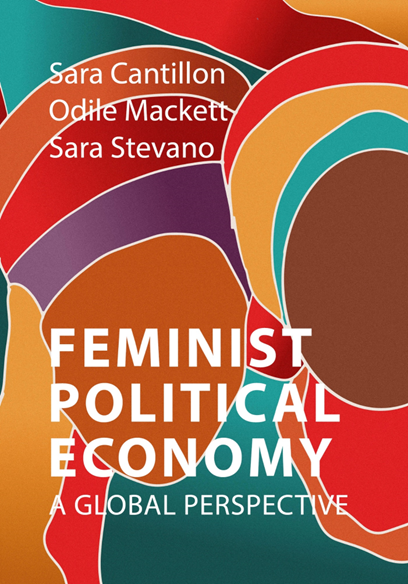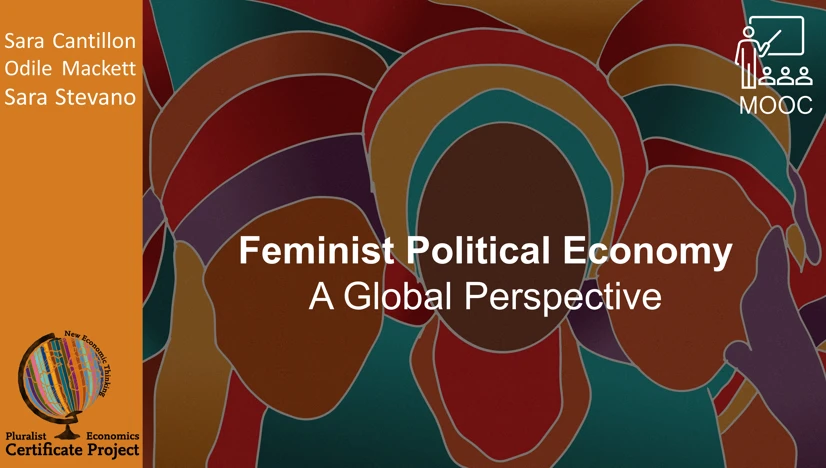Feminist Political Economy - A Global Perspective
Certificate Project
Information on the course
Feminist political economy is essential to understanding the power relations and hierarchies that shape and sustain contemporary capitalism. Motivated by the rejection of gender-blind approaches in economics feminist political economy provides compelling insights into the relations between the economic, the social and the political in the reproduction of inequality.
This Online Course is based on the book "Feminist Political Economy - A Global Perspective" by Prof. Sara Cantillon (Glasgow Caledonian University), Dr. Odile Mackett (University of the Witwatersrand) and Dr. Sara Stevano (SOAS London),. The course as well as the book provide a much-needed introduction to the key topics in feminist political economy that are necessary to understand inequality in the contemporary global socio-economic system. The authors take a global perspective throughout and engage in debates that are relevant for the Global North and/or the Global South. The course offers students a deeper and more nuanced understanding of the role of power relations and inequality in the global economy.
Accompanying textbook
The book is the base for the course and includes readings complementary to the lecture videos. The chapters are structured as lectures in a university module and are grouped around four thematic themes: key principles; public-private divides; employment; and policy approaches.
It was published in 2023 with Agenda Publishing.
ISBN: 9781788212649
Course structure
Chapter 1. Feminist Political Economy: A Global Perspective
Chapter 2. Global Division of Labour
Chapter 3. Social Reproduction
Chapter 4. Care
Chapter 5. Households
Chapter 6. Intra-Household Inequalities
Chapter 7. Labour Market Inequalities
Chapter 8. Welfare Regimes and Policies
Chapter 9. Feminisation of Poverty
Chapter 10. Economic Crises and Policies
Chapter 11. GDP and Alternative Measures of Well-Being
Each chapter translates to roughly one hour of video material, accompanied by excerpts from the book and additional readings.
Supported by:

Chapter 1 - A Global Perspective on Feminist Political Economy
Discussion Questions
- How can the origins of feminist political economy be described?
- Why do you think that there is a current renewed interest in this field?
- What are the main features of feminist political economy? How would you characterize feminist political economy?
- What is intersectionality and how does it matter to a global feminist political economy approach?
Resources
- Lebohang Liepollo Pheko’s TED Talk on ‘Feminist economics is everything. The revolution is now!’ (17min)
- Angela Davis on ‘Black feminism and intersectionality’ (4min)
- Shirin Rai on ‘Feminist everyday political economy: space, time and violence’ (46min)
- Global Protest Tracker
Chapter 2 - Global Division of Labour
In your own time
- Read section 2.3.2 (pp. 35-39)
- Reflect on the following questions:
- What is super-exploitation?
- Does women’s participation in the labour-intensive export-oriented industry lead to super-exploitation?
- Can participation in the labour force be a route to empowerment for women? And for men?
Additional sources on the Covid-19 pandemic and inequalities:
- Kabeer, N., Razavi, S., & van der Meulen Rodgers, Y. (2021). Feminist economic perspectives on the COVID-19 pandemic. Feminist Economics, 27(1-2), 1-29.
- Stevano, S., Ali, R., & Jamieson, M. (2021). Essential for what? A global social reproduction view on the re-organisation of work during the COVID-19 pandemic. Canadian Journal of Development Studies/Revue canadienne d'études du développement, 42(1-2), 178-199.
- Stevano, S., Franz, T., Dafermos, Y., & Van Waeyenberge, E. (2021). COVID-19 and crises of capitalism: intensifying inequalities and global responses. Canadian Journal of Development Studies/Revue canadienne d'études du développement, 42(1-2), 1-17.
- Tejani, S., & Fukuda‐Parr, S. (2021). Gender and COVID‐19: Workers in global value chains. International labour review, 160(4), 649-667.
- Wiegratz, J., Behuria, P., Laskaridis, C., Pheko, L. L., Radley, B., & Stevano, S. (2023). Common challenges for all? A critical engagement with the emerging vision for post pandemic development studies. Development and Change.
Chapter 3 - Social Reproduction
In your own time
- Read section 3.6, pp. 62-64
- Article in Feminist Economics by Sara and colleagues: (2021) Hidden Abodes in Plain Sight: the Social Reproduction of Households and Labor in the COVID-19 Pandemic, Feminist Economics, 27:1-2, 271-287, DOI: 10.1080/13545701.2020.1854478
In your own time
- Contemporary social reproduction approaches used to improve our understanding of work, labour process and commodification – read section 3.5 (pp. 58-62) or RIPE special issue on ‘Global feminist political economies of work and social reproduction’
Chapter 4 - Care
In your own time
- Nancy Folbre’s lecture ‘For Love and Money: the Distinctive Features of Care Work’ (1hr 24min)
- Sara Cantillon on the relational nature of care
Resources:
- Institute for New Economic Thinking’s interview with Nancy Folbre ‘The Economics of Care’ (15min)
- Women’s Budget Group webinar ‘A care-led recovery and building back better’ with Sue Himmelweit, Ann Pettifor, Sarah Bedford, Nadia Whittome and Danielle Paffard, chaired by Faiza Shaheen (59min)
- Website of the network of researchers ‘Care Work and the Economy’ that advances policy solutions with gender-aware macroeconomic models
- BRIDGE’s cutting edge pack on gender and care
- The International Center for Research on Women’s (ICRW) webpage on gender and care
- Political Economy Research Institute’s (PERI) program on gender and care work
- International Labour Organization’s (ILO) webpage on the care economy
- Nancy Folbre, The Great Transition
Chapter 6 - IntraHousehold Inequalities
Resources:
- European Union Statistics on Income and Living Conditions (EU SILC)
- World Bank’s Living Standards Measurement Study (LSMS)
- Demographic and Health Survey (DHS) by the United States Agency for International Development (USAID)
- International Household Survey Network continuing all household surveys conducted across the world
- Statistics on Households and Families by the United Nations Statistics Division (UNSD)
Comment from our editors:
This course was created in collaboration with the authors and the German Network for Pluralism in Economics. It is part of the Plural Certificate Project and is offered regularily as a course with ECTS.
Interested in adapting the course materials for your own teaching? Send us a message at certificate[a]plurale-oekonomik.de

